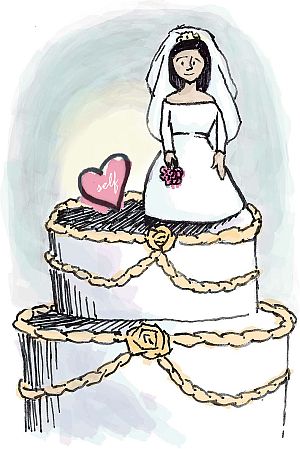your presence is requested to witness the marriage of me and … me
 I love weddings. They’re big parties that are all about celebrating love, catching up with people you never see, and dancing to ’80s and ’90s pop while tipsy.
I love weddings. They’re big parties that are all about celebrating love, catching up with people you never see, and dancing to ’80s and ’90s pop while tipsy.
They’re a public declaration of a new chapter in the couple’s life; of the two of them having figured out what they want to do with their lives, what they want their lives to be, and that they want to live them together.These are mind?boggling achievements and I will never get tired of celebrating them with my people.
What happens, though, when you’ve got everything sorted except someone to do it with? How does one celebrate a fulfilled yet unpartnered life?
If you’re a Melbourne woman named Mary-Anne, you marry yourself.
According to journalist Kristin Shorten, sometime in 1994 or 1995, Mary-Anne turned 30 and, tired of waiting for a man, decided to throw a wedding reception just for herself. There was no ceremony, but everything else – bridesmaids, photographs, a bridal table, three-course meal, dancing, cake.
Unusual as it may be, this solo wedding isn’t the only one of its kind. Last May, 36-year-old mother of two Nadine Schweigert made headlines by marrying herself. For her, ‘it was me standing up for myself and owning that I’m responsible for my happiness.’ Unlike Mary-Anne, she had a ceremony with vows and a bouquet and, in true American style, got a talk show to do a segment on her where she’s very articulate about the whole process:
It’s not just a Western thing, either. In Taiwan, the pressure on women to marry is extra high these days with a government campaign telling them it’s their patriotic duty to keep the country’s birth rate up. For Chen Wei-yih, self-marriage was a great option to celebrate her life.
‘Age 30 is a prime period for me,’ she said of her solo wedding in 2010. ‘My work and experience are in good shape, but I haven’t found a partner, so what can I do?’
It sounds like a great idea to me. But I did a similar thing when I turned 30, only I just called it a “birthday party”. It was an enormous, expensive, fully-catered birthday party, but still. There were decorations, invitations, RSVPs, a dress code, a special outfit for me, all my favourite foods, much wine and beer, a band, cake, and speeches.
A public celebration fulfils two important purposes: it allows the person or people at its centre to share with the world their hope and joy about something; and it allows the significance of that something to be publicly recognised and validated.
That Mary-Anne’s story is lifestyle-pages-worthy shows that most people find self-commitment an odd idea. But as all of our culture’s most significant rituals are centred around marriage and having children, there’s very little scope for those of us who don’t get married or have children to mark our life stages.
As a culture, we don’t know how to celebrate important life decisions, like being able to break up with a douchebag before he devours your self-esteem, or taking a risk on a project you’re passionate about, or moving cities or countries in the pursuit of happiness.
There’s a saccharine coda to the story of Mary-Anne that makes me think it’s an urban legend. Apparently her solo wedding ended with a workmate stomping into the function room in actual shining armour to declare his long-standing crush and ask her out. And just to tip it over into total absurdity, apparently they got married exactly a year later.
There’s that stranger than fiction thing though, so one never knows.


What if you married yourself and it didn’t work out? Would you have to undergo divorce proceedings or treatment for split personality?